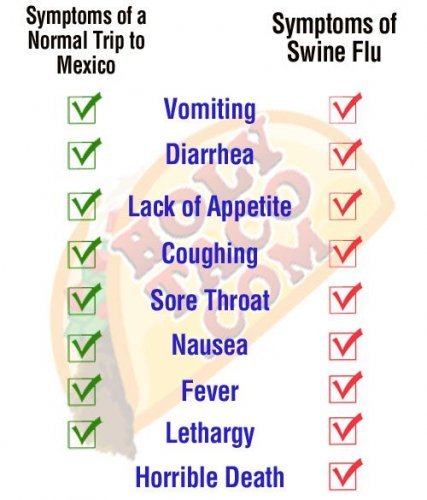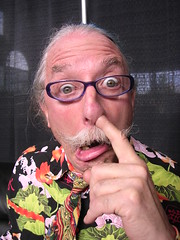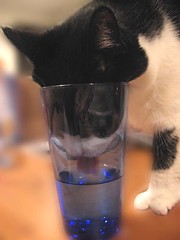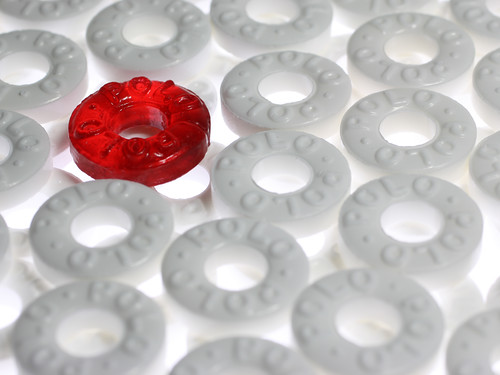Everything you wanted to know about medical school but were afraid to ask me directly
The following is a growing set of questions you asked me. Well, technically, you asked Google, and Google told you to see me*. So here it is, without any particular order or priority.
On inspiration and creativity in medicine
keywords:
creativity,
education,
Ken Robinson,
medical school
/
Comments: (0)
Inspiration seems to be the theme of the month for me, so I thought I would share an inspirational moment with you. Below is a 20 minute speech by Ken Robinson, who, as I learned recently, is one of the best speakers you will ever hear. Although he talks about education in general and its relation to creativity, this talk got me thinking about premedical and medical education.
Poll: What do you think about the MMI's (multiple mini-interviews)?
As it stands right now, I think the MMI's are the only specific and sensitive way to weed out people who are into medicine for the wrong reasons. You cannot prepare for the situations, thus you will be forced to act genuinely. If you think people can fake it, you underestimate the level of stress associated with the situations. They might ask you to talk to "your friend" in one, but most of them will be difficult and nerve wrecking.
Wisdom from Dr Patch Adams
keywords:
canadian medical schools,
doctor,
Dr Patch Adams,
medicine,
Patch Adams
/
Comments: (0)
I was very fortunate to be able to attend a lecture given by one the world's most caring doctors. He, who's name made Robin Williams 20 million dollars, he who told us that he could not stand his first year in peds because his view of medicine was so staggeringly different. I am, of course, talking about Dr. Hunter Campbell Adams, more commonly known as Patch Adams.
Although there were many great things in that speech, I wanted to share a couple because of their impact on me personally.
Choosing a medical specialty
keywords:
AAMC,
canadian medical schools,
careers in medicine,
medical school,
medicine,
residency,
specialty
/
Comments: (0)
It is an unfortunate truth of experiential reality that choices are not clear-cut, and the event window for choice may vanish before the information enabling the choice is present.
Eluki bes Shahar
For those lucky enough to have the need to contemplate this...
Ref: http://aggiepie.files.wordpress.com/2008/05/12medicalspecialtystereotypesfull.jpg
Ref: http://www.huffingtonpost.com/dr-peter-rost/want-to-become-a-doctor_b_20148.html (via BMJ?)
All jokes aside, researching which specialties you prefer early on in your medical school years has its advantages. These include the pre-clinical years as much as the later, more exciting time spent in the hospital rotations.
For pre-clinicals, you will want to get a mentor who practices in the specialty you are interested in. This will allow you to be in the hospital early on, with no pressure to perform. You'd be surprised how much you will notice when you are not concerned with evaluations/patient responsibility. You also, more importantly, get to see the "collective body" of the specialists. There are definite stereotypical traits attributable to some specialties more than to others. The common example would be a more commanding or dominating personality for surgery. Does that mean you cannot be a calm, mellow surgeon? Absolutely not! But the law of life is that you will find it much harder to be the exception.
For the clinical years, there is a lot more to do. For example, if you decide to aim for dermatology, you might want to make sure you get an invitation to Stockholm for their annual ceremony, or at least put in the extra effort to beef up your application. Another example would be doing extra electives at rural sites to get experience in self-reliance for a great career in family medicine. If you like a particular program, it is usually good to get an elective there. According to CaRMS, some universities openly state they have preferential treatment for people with whom their faculty is familiar from such electives.
For a competitive specialty, you would probably want to get involved in research in a related field. The reasons are twofold. Firstly, what better way to put your foot where your mouth is when it is time to back up your claim of interest in the specialty. Some elite residency programs in the States require you to have done research, published, or even to have a Msc degree. Secondly, don't neglect the opportunity to get to know the program director of your Oh-So-Desired-Specialty if you get a summer grant in their lab/hospital clinic. Although I will elaborate on it in later post, I would caution you from molecular biology research unless you absolutely love it and know exactly what you want to do. Most likely you are going to be a practicing clinician, so stick to the clinical.
Some residencies, it turns out, are more competitive and select from an extensive pool of medical graduates for a minute number of spots. You'll immediately recognize that this early preparation for one critical point in your life vaguely reminds you something...However, your competition just received a serious upgrade from the last time you had to prove you are better than the average Joe to the medical school admissions committee.
And finally, some serious tools:
- Careers in Medicine via AAMC (usually your career advising office will email you a password)
- Medical Specialty Aptitude Test
- The Ultimate Guide to Choosing a Medical Specialty
via Amazon
(The best book I found on the subject, although by no means perfect. In fact, much of it is focused on US specifics, which are somewhat irrelevant for hardcore Canadians like us. Don't feel insulted if you are from outside of Canada, I did mention in the prelude to this blog that I write for and about Canadian medical school applicants/students) - Your colleagues in upper years. Corner one and question them about their rotations in a given specialty. If you are extroverted enough, you could probably get away with leeching on to them for a day in the hospital. From my experience, there is much more amicability and much less cut-throat attitudes in medical school than there are in premed.
The MCAT will change
keywords:
AAMC,
MCAT,
medical school,
medicine
/
Comments: (2)
Before I talk about the changes, I would like to digress for a little bit. Although the MCAT season is almost over, quite a few of my good friends have either just recently come back from AAMC-land or will be going there soon. With so much MCAT in my life this summer, despite my strong desire to erase the memories of my own test taking, I felt a post about the elephant in the room was appropriate. I am sure that either you or somebody around exclaimed at least once "This MCAT is stupid! It tests all those little things. Why on Earth would I need to know the Krebs cycle or Heisenberg's uncertainty principle? If this is the case, the following article would soothe your mind and clear your conscience if you had spent time studying for it.
Who are you ? (poll summary, July 10-17, 2009)
WHO ARE YOU?
Pre-med | 11 (78%) |
Medical student | 2 (14%) |
MD | 0 (0%) |
I am not in the medical field | 1 (7%) |
Votes: 14
Medical school personal statement tips from the opposite side
keywords:
admissions,
advice,
application,
autobiographical letter,
autobiographical sketch,
medical school,
personal statement
/
Comments: (3)
Things you should do for a guaranteed acceptance?
- Forget to edit out another school's name in your essay. In the same train of thought, you should not be bothered by actually answering each school's specific questions. Instead, simply write a generic essay about what you think they should know and send it to all schools.
- Have multiple grammatical and syntactic mistakes. Here are a few specific tips:
- Avoid run-on sentences they are hard to read.
- Never use no double negatives.
- Use the semicolon properly, always where it is appropriate; and never where it is not.
- Reserve the apostrophe for it's proper use and omit it where it is not needed.
- Make it crystal clear that you don't really care if they accept you, since they are not your first choice anyways. To be sure the admission committee knows 'who's the man', state that they should feel honored that you even applied.
- Write things that are not true, in great amounts, providing lots of colorful details. For example, mention you like Mozart and play piano, since it sounds much better than spending every other night playing Wii and listening to Kurt Cobain and Marilyn Manson.
- Make an emphasis on the how's, not the why's. For example, spend a whole paragraph describing exactly what you did during your volunteering (preferably providing a detailed schedule), and omit what you took out of it. Feelings and introspection are for sissies.
- Do not be afraid to brag. You did it, right? Why should you be ashamed of your own accomplishments?! Besides, every doctor I know is arrogant, this type of personality trait seems to give you that special extra edge before the admissions committee.
- Pick a controversial topic and make sure to take an uncompromising, unilateral stand on it. For example, say that you are for saving lives and that Jehovah's witnesses are all a bunch of unenlightened inbred retards in regards to blood transfusions. The ad coms will love a doctor who can defend his convictions when he is confronted by patients.
- If you have a bad grade/MCAT score, please do yourself a favor and use your essay to explain why. It would be such a shame if the ad coms did not know that the "F" in intro to fairy tales was your sister's fault - she just had to get pregnant at thirteen and get dumped by her boyfriend when you were taking that course/MCAT. As you see from my example, you get extra points if you blame your failure on someone else.
- Never let anyone else read your essay, because they either do not know you well OR they know very little about the admissions process. Their advice will not bring anything you haven't thought of for your application. If you do find somebody who possesses knowledge about both yourself and the application, make an extra effort to hide your essay from them. Obviously, they (or their friends/family) are also applying and they will use whatever you give them for their own draft. Consequently, it is a good idea to submit as soon as you finish typing the first draft - that way you can claim intellectual property on your literary masterpiece should there be a dispute.
- Here are some excellent reasons for becoming a doctor to use in your essay:
- Because my parents/close relatives are doctors.
- Because I loved ER/House/Scrubs/Grey's Anatomy and want to be just like them.
- Because I knew since I was little that all I wanted to do is be a doctor.
- Because I love people.
- Because I want to help people.
- Because as a doctor I will have employment security.
- Because I always wanted to give orders to other people and have them actually listen to me.
- Because I promised my girlfriend/boyfriend and now I don't want to back out.
- Because... Well, I don't really know why, I just thought it seemed cool and I ought to try it.
- etc...
- Buy a "Collection of the Best in the World Essays That Got Their Writers into Medical School" type of book, look for the most creative one, type it up (at this point you may use your name, if you wish; additionaly, you may wish to change some facts to make the story closer to your own life, but that is absolutely optional) and submit it.
- Use the thesaurus, for Christ's sake (because common everyday words just do not impress ad coms nowadays)! Here are a couple of words to get you started:
- gargantuan instead of large/huge
- interminable instead of endless/very long
- pulchritude instead of beauty
- tyro instead of beginner/novice
- Finally, under no circumstances should you visit or use the information provided below:
- http://books.google.com/books?id=W3gfDobI3MUC&lpg=PA87&ots=2E2NqxBWpX&dq=kaplan%2010%20mistakes%20to%20avoid%20personal%20statement&pg=PA87
- http://books.google.com/books?id=B6kS0Zcj0e4C&lpg=PA101&ots=a-gfTevBue&dq=kaplan%2010%20mistakes%20to%20avoid%20personal%20statement&pg=PA101
- http://www.essayedge.com/medical/essayadvice/course/ (this one requires a registration, so do not even bother wasting your time)
- http://www.petersons.com/common/article.asp?id=1009&path=gr.gs.advice&sponsor=1
For more examples go to the full list. (Almost forgot: U need 4 shoe 2 write in c00l chat lingo str8 off the net, I swear, the ad coms dig it)
The Ups and Downs of Applying for Medical School
keywords:
admissions,
canadian medical schools,
medical school,
medicine,
personal,
rejection
/
Comments: (0)
Today is a special occasion, because we have a guest post. P.L. has written about his hurdles with what is the main theme of the day on my blog, 24/7/356. Please be kind, constructive and critical - leave comments, so he might write again... (remark by premedc)
--
I’m sure most of you have heard the expression “Being a doctor isn’t easy”. Doctors not only have to work crazy hours, not only are they responsible for the lives of their patients, but they have to do all of this and at the same time manage their time effectively so that they can have time with their family and friends. Easy right? Well I’m sure the fact that the divorce rate for physicians is 10-20% higher than the general population is a testament to exactly how difficult it really is. But the purpose of this post is not to dissuade you from wanting to be a physician or to tell you about the hardships that physicians have to face, because the reality is that you are not physicians yet. Instead I’m going to talk to you about the application process to medical school and how some future physicians learn how hard their job is before even being accepted to medical school. I will be talking to you about my own experiences applying to medical school and maybe you can learn something worthwhile from my wild roller coaster ride.
Medical school application process (or the Ten Steps of Medical Admissions Application)
keywords:
application,
medical school,
preparation,
review
/
Comments: (1)
So, you bought a stethoscope and want to order those business cards with the coveted M.D. on them next to your name? Well, applications to medical schools sound like a good idea to begin with. I feel a little odd writing a whole article about what might be more than obvious to you over-zealous mega-achievers. However, I also feel some of you will severely underestimate the importance of spending enough time on the actual application process (as opposed to the years of preparation that go into having something to write on that application). For shortness' sake, let us assume you have accumulated enough padding for your CV, took the MCAT and aced it, and you feel mature enough to become a doctor (I will write about that one soon, when I discuss the interviews). Here are the Ten Steps of Successful Medical School Applications (this is a quick guide, so don't blame for not being thorough):
Voice of reason or crowd panic? (Swine flu thoughts)
keywords:
common sense,
Swine flu
/
Comments: (0)
Undoubtedly, you have heard of the Swine Flu. Unfortunately, you have heard of it a little too often. Ad nauseam, I would say, but then you'd ask if this was a symptom. It seems that fear campaigns bring media the most popularity, and this meant they could not pass up such a golden opportunity. From every direction we are flooded with fear-breaking headlines like the following:
Just to finish on a rather entertaining, yet certainly not serious, idea (except if you are from Mexico):

Found on http://snooz3r.tumblr.com/post/101960469/symptoms
- W.H.O. May Raise Alert Level as Swine Flu Cases Leap in Japan ...
- H1N1 continuing to spread worldwide, health officials warn
- Flu not dwindling as fast as hoped, experts say
- Flu virus 'all over the place' in Quebec
- Battle with swine flu: 'I thought I would die'
- With Swine Flu Spreading, City Seeks to Reduce Threat - City Room ...
- How many people got sick? survived? died? from this H1N1 swine flu.
- How infectious is it?
- How does the swine flu compare to other things that are not reported in this article, e.g. influenza in terms of virulence?
Just to finish on a rather entertaining, yet certainly not serious, idea (except if you are from Mexico):

Found on http://snooz3r.tumblr.com/post/101960469/symptoms
How and why I got into medical school
keywords:
getting in,
insight,
medical school,
personal
/
Comments: (1)
To paraphrase the famous expression "You don't know what you got, until it's gone" more appropriately for this post - "You don't know what you'll have until it's yours".
While I was still in the premed camp, I used to dream about the time these life-changing words would be addressed to me - "Congratulations, you have been selected..." and dreading yet another "Dear candidate, despite your excellent dossier, you were not selected..." (I have received more than a couple of those). For years, I used to speak in the conditional "If I become I doctor...". It sort of became a reflex, a second nature of mine. And during those years I thought of the moment of getting my acceptance as a sharp 90 degree turn you sometimes encounter on the country side or Canadian urban centres. When you see it ahead, you have to slow down and make sure you stay in your lane. In the same way I thought I would change my life trajectory when the new and better stretch of my life appeared in front of me. Many exciting events in mind were tied to Being Accepted. "I will do this... I will try that...". But all ended with "if only I was accepted" - although I was never superstitious, the grandeur of the subject made me almost religious when discussing it. Which, by the way, shows just how feeble the whole thing was. As the list of things to do or to try grew, so did the weight and the importance of the aftermath. It became harder and harder for me to bear the possibility of rejection, with so much value attached to this one event, not even entirely under my control. Also, as I put on hold many if not all of the things I really wanted to do, I became less and less happy. But I did not notice this, I was too preoccupied with my thoughts.
This was then.
While I was still in the premed camp, I used to dream about the time these life-changing words would be addressed to me - "Congratulations, you have been selected..." and dreading yet another "Dear candidate, despite your excellent dossier, you were not selected..." (I have received more than a couple of those). For years, I used to speak in the conditional "If I become I doctor...". It sort of became a reflex, a second nature of mine. And during those years I thought of the moment of getting my acceptance as a sharp 90 degree turn you sometimes encounter on the country side or Canadian urban centres. When you see it ahead, you have to slow down and make sure you stay in your lane. In the same way I thought I would change my life trajectory when the new and better stretch of my life appeared in front of me. Many exciting events in mind were tied to Being Accepted. "I will do this... I will try that...". But all ended with "if only I was accepted" - although I was never superstitious, the grandeur of the subject made me almost religious when discussing it. Which, by the way, shows just how feeble the whole thing was. As the list of things to do or to try grew, so did the weight and the importance of the aftermath. It became harder and harder for me to bear the possibility of rejection, with so much value attached to this one event, not even entirely under my control. Also, as I put on hold many if not all of the things I really wanted to do, I became less and less happy. But I did not notice this, I was too preoccupied with my thoughts.
This was then.
More odd ways of preparing for the MCAT
This, folks, will be the last post in my MCAT series. On the one hand, I feel like a million bucks not having to think about that horrendous test ever again. On the other hand, I do sympathize with my readers who, temporarily, are still forced to depend on the AAMC with their future. In any case, here are my last bits on the Medical College Admissions Test.
Visual Analysis of MCAT Re-tester Results
I was accepted into Medicine, more about that in a later post... I am truly overwhelmed right now. On top of everything, I cannot enjoy myself as fully as I wished to because of finals. I will start posting more stuff after the 22nd of April.
I remember I promised a couple more posts about the MCAT, and, indeed, this one is. However, we will zone in on a rather narrow topic. Numerous times I came across forum posts asking whether or not people should re-take the test. And every time a multitude of opinions seemed to confirm the lack of general consensus. As you may or may not know, the AAMC has (in fact, had) a relatively elaborate dataset about people who re-take the MCAT. How does (maybe, did?) this help us? Well, observe below and decide for yourself, based on large number stats whether or not you should re-take the test.
I remember I promised a couple more posts about the MCAT, and, indeed, this one is. However, we will zone in on a rather narrow topic. Numerous times I came across forum posts asking whether or not people should re-take the test. And every time a multitude of opinions seemed to confirm the lack of general consensus. As you may or may not know, the AAMC has (in fact, had) a relatively elaborate dataset about people who re-take the MCAT. How does (maybe, did?) this help us? Well, observe below and decide for yourself, based on large number stats whether or not you should re-take the test.
on the future and MMIs
keywords:
autobiographical letter,
autobiographical sketch,
CV,
interview,
medical school,
medicine,
MMI,
news,
references,
research,
University of McGill,
updates
/
Comments: (3)
It has been a while since I had last posted, but the reason is as always - I had been too busy. Well, time to catch up a bit. I felt like sharing some of personal the news for those of you who have been following me since the beginning (others are welcome to read, but if you skip I will not send the Dark Knight of Death with a rusty ax after you, you have my word. Also, you will not lose any precious advice, since I just mumble about my humble self this time).
So, the news (trumpets, please): In late March I will be doing the MMI interview at one of the best Canadian Medical Schools (this, let alone midterm exams, has been keeping me quite busy).
As a forecast for this blog, I can predict at least one or two more posts about the MCAT, after which I will start a series about submitting your applications. These will talk about writing a killer CV, an exquisite autobiographical letter/sketch, and making sure you don't screw up with references.
Then I will follow up with interview preparations, tips, hints, my own experience and more stuff about the MMI. I hope to cover everything from what you should wear to how to answer the mean/odd/unexpected questions.
Later, albeit out of chronological order, I will be talking about extracurricular experiences, my own and other peoples', research, sports, etc. I will try to get somebody who had done each one of these to describe it in their own words.
Finally, this blog will have 2 possible outcomes. Very soon I will know whether I got in or not. If I do get in, I will (and here I am a bit hesitant whether to get a new blog or keep posting to this one) start posting about my life as a med student. If I do not get accepted, I will keep writing about "getting in" as I struggle one more year until I do get in. Some things are just meant to be. One wants to think.
Stay tuned.
So, the news (trumpets, please): In late March I will be doing the MMI interview at one of the best Canadian Medical Schools (this, let alone midterm exams, has been keeping me quite busy).
As a forecast for this blog, I can predict at least one or two more posts about the MCAT, after which I will start a series about submitting your applications. These will talk about writing a killer CV, an exquisite autobiographical letter/sketch, and making sure you don't screw up with references.
Then I will follow up with interview preparations, tips, hints, my own experience and more stuff about the MMI. I hope to cover everything from what you should wear to how to answer the mean/odd/unexpected questions.
Later, albeit out of chronological order, I will be talking about extracurricular experiences, my own and other peoples', research, sports, etc. I will try to get somebody who had done each one of these to describe it in their own words.
Finally, this blog will have 2 possible outcomes. Very soon I will know whether I got in or not. If I do get in, I will (and here I am a bit hesitant whether to get a new blog or keep posting to this one) start posting about my life as a med student. If I do not get accepted, I will keep writing about "getting in" as I struggle one more year until I do get in. Some things are just meant to be. One wants to think.
Stay tuned.
Free MCAT tools

Happy New 2009 Year!
I thought it is only fair to start a new year with free tools to master the MCAT. So what do I have in store? You probably will have come across some of the things I will mention. Some, I hope, will be a pleasant surprise. In any case, I do believe a budget solution is possible for the MCAT. So let us get started.
Yaaaay! Freebies.














